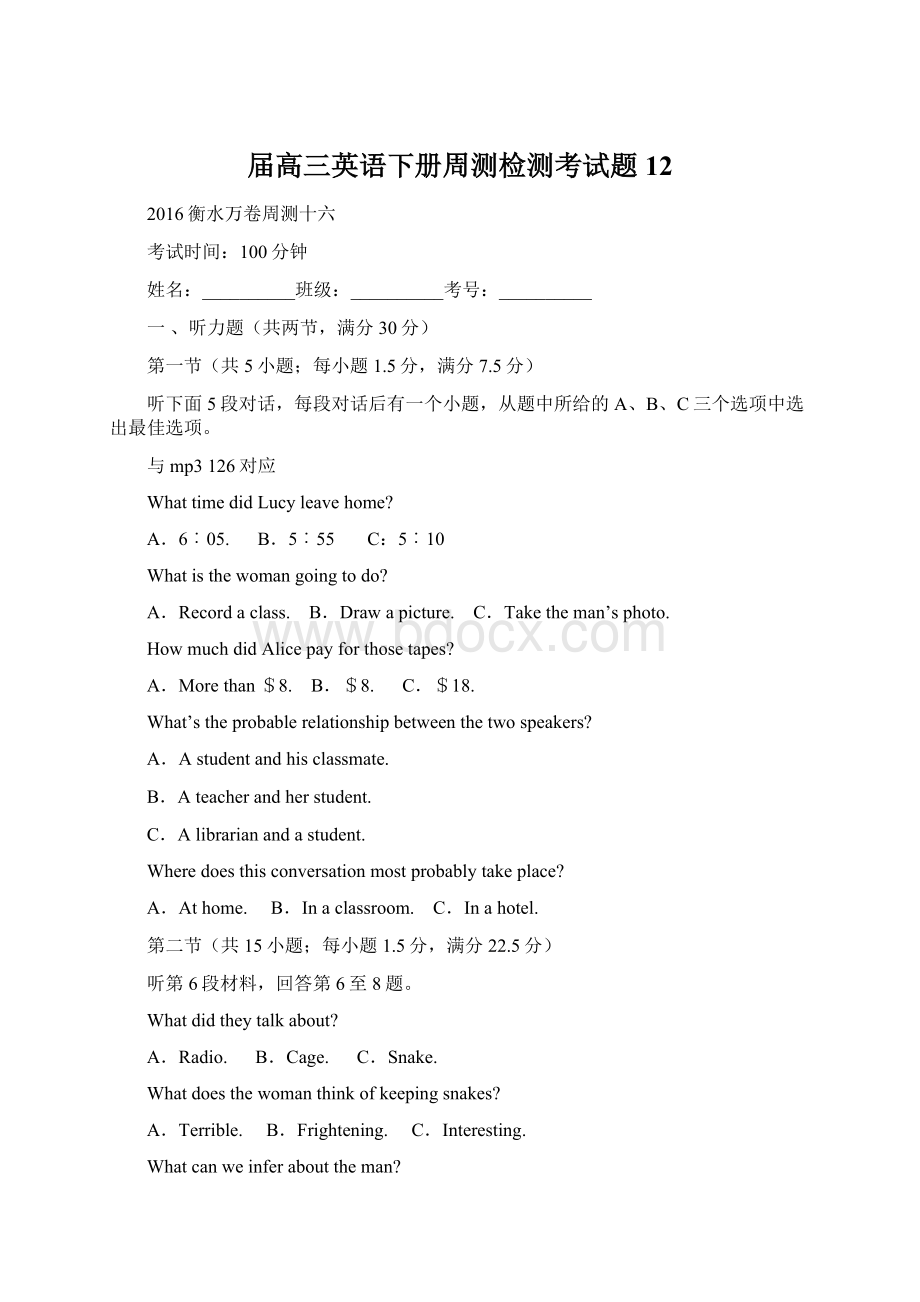届高三英语下册周测检测考试题12文档格式.docx
《届高三英语下册周测检测考试题12文档格式.docx》由会员分享,可在线阅读,更多相关《届高三英语下册周测检测考试题12文档格式.docx(17页珍藏版)》请在冰豆网上搜索。

A.Recordaclass.B.Drawapicture.C.Taketheman’sphoto.
HowmuchdidAlicepayforthosetapes?
A.Morethan$8.B.$8.C.$18.
What’stheprobablerelationshipbetweenthetwospeakers?
A.Astudentandhisclassmate.
B.Ateacherandherstudent.
C.Alibrarianandastudent.
Wheredoesthisconversationmostprobablytakeplace?
A.Athome.B.Inaclassroom.C.Inahotel.
第二节(共15小题;
每小题1.5分,满分22.5分)
听第6段材料,回答第6至8题。
Whatdidtheytalkabout?
A.Radio.B.Cage.C.Snake.
Whatdoesthewomanthinkofkeepingsnakes?
A.Terrible.B.Frightening.C.Interesting.
Whatcanweinferabouttheman?
A.Heisfrightenedofsnake.
B.Helikeskeepingsnakesaspets.
C.Heisinterestedinpets.
听第7段材料,回答第9至11题。
Whereisthewomanfrom?
A.TheUSA.B.TheUK.C.Canada.
HowmanytimeshasthewomanbeentoBeijing?
A.Never.B.Twice.C.Threetimes.
Wheredoesthewomanwanttogo?
A.ShanghaiRoad.B.Theschool.C.Thepostoffice.
听第8段材料,回答第12至14题。
Whattheprobablerelationshipbetweenthetwospeakers?
A.Classmates.B.Colleagues.C.Friends.
Whycan’tthemanleaveearly?
A.Heisstillplanningto.
B.Thebossdoesn’tallowhimtodoso.
C.Hehasn’tfinishedhiswork.
Whatdoesthewomanoffertodo?
A.Helphimfinishhiswork.B.Pickuptheman’sson.C.Cleantheoffice.
听第9段材料,回答第15至17题。
Whatdoesthemanaskthewomantodo?
A.TeachhimEnglish.
B.IntroduceagoodEnglishteachertohim.
C.Teachhimprivatelessons.
Whydoesthemanneedateacher?
A.BecausehewantstostartanEnglishconversationclassathiscompany.
B.HewantstolearnEnglishforhisjob.
C.HissonneedshelpinEnglish.
Whichofthefollowingistrue?
A.Thewomanmayhelptheboyforhisstudy.
B.ThemanwillworkhardatEnglish.
C.ThewomanwillhelpthemantolookforanEnglishteacher.
听第10段材料,回答第18至20题。
Whydidthemanvisitthedoctor?
A.Thereissomethingwrongwithhishead.
B.Thereissomethingwrongwithhisstomach.
C.Thereissomethingwrongwithhisfoot.
Whendidthetailorfeeluncomfortable?
A.Heatetoomuch.
B.Hegotsomeillnessstrange.
C.Heworriedtoomuch.
Whatistheprobablerelationshipbetweenthetwopatients?
A.Strangers.B.Friends.C.Tailorandcustomer.
二、阅读理解(共两节,满分40分)
第一节(共15小题,每小题2分,满分30分)
阅读下列短文,从每题所给的四个选项(A、B、C和D)中,选出最佳选项
A
Anewstudyshowsstudentswhowritenotesbyhandduringlecturesperformbetteronexamsthanthosewhouselaptops(笔记本电脑).
Studentsareincreasinglyusinglaptopsfornote-takingbecauseofspeedandlegibility(清晰度).Buttheresearchhasfoundlaptopusersarelessabletorememberandapplytheconceptstheyhavebeentaught.
Researchersperformedexperimentsthataimedtofindoutwhetherusingalaptopincreasedthetendencytomakenotes“mindlessly”bytakingdownwordforwordwhattheprofessorssaid.
Inthefirstexperiment,studentsweregiveneitheralaptoporpenandpaper.Theylistenedtothesamelecturesandweretoldtousetheirusualnote-takingskills.Thirtyminutesafterthetalk,theywereexaminedontheirabilitytorememberfactsandonhowwelltheyunderstoodconcepts.
Theresearchersfoundthatlaptopuserstooktwiceasmanynotesasthosewhowrotebyhand.However,thetypistsperformedworseatrememberingandapplyingtheconcepts.Bothgroupsscoredsimilarlywhenitcametomemorizingfacts.
Theresearchers'
reportsaid,"
Whilemorenotesarebeneficial,ifthenotesaretakenmindlessly,asismorelikelythecaseonalaptop,thebenefitdisappears."
Inanotherexperimentaimedattestinglong-termmemory,studentstooknotesasbeforebutweretestedaweekafterthelecture.Thistime,thestudentswhowrotenotesbyhandperformedsignificantlybetterontheexam.
Thesetwoexperimentssuggestthathandwrittennotesarenotonlybetterforimmediatelearningandunderstanding,butthattheyalsoleadtosuperiorrevisioninthefuture.
Moreandmorestudentsfavorlaptopsfornote-takingbecausetheycan.
A.writemorenotesB.digestconceptsbetter
C.gethigherscoresD.understandlecturesbetter
Whiletakingnotes,laptopuserstendtobe.
A.skillfulB.mindless
C.thoughtfulD.tireless
Theauthorofthepassageaimsto.
A.examinetheimportanceoflong-termmemory
B.stressthebenefitoftakingnotesbyhand
C.explaintheprocessoftakingnotes
D.promotetheuseoflaptops
Thepassageislikelytoappearin.
A.anewspaperadvertisementB.acomputertextbook
C.asciencemagazineD.afinancereport
B
Wouldyoueatareadymealfromthefridgeratherthancookfromscratch?
Haveyoubeendoinginternetshoppingratherthangoingtothestores?
Whatcan’tyoubebotheredtodo?
AstudyintohowlazyBritishpeoplearehasfoundmorethanhalfofadultsaresolazythatthey’dcatchtheliftratherthanclimbtwoflightsofstairs.
Justover2000peoplewerequizzedbyindependentresearchersatNuffieldHealth,Britain’slargesthealthcharity.Theresultswereastonishing.
Aboutoneinsixpeoplesurveyedsaidiftheirremotecontrolwasbroken,theywouldcontinuewatchingthesamechannelratherthangetup.
Morethanonethirdofthosequestionedsaidtheywouldnotruntocatchabus.Worryingly,ofthe654respondentswithchildren,64%saidtheywereoftentootiredtoplaywiththem.
Thisledthereporttoconcludethatit’snowonderthatoneinsixchildrenintheUKareclassifiedasobese(veryfat)beforetheystartschool.
DrSarahDauncey,medicaldirectorofNuffieldHealth,said,“Peopleneedtogetfitter,notjustfortheirownsake,butforthesakeoftheirfamilies,friendsandevidentlytheirpetstoo.”
“Ifwedon’tstarttotakecontrolofthisproblem,awholegenerationwillbecometoounfittoperformeventhemostrudimentaryoftasks.”
AndScotland’slargestcity,Glasgow,wasshamedasthemostinactivecityintheUK,with75%surveyedadmittingtheydonotgetenoughexercise,followedcloselybyBirminghamandSouthampton,bothwith67%.
TheresultscauseseriouschallengesfortheNationalHealthService,whereobesity-relatedillnessessuchasheartdiseaseandcancerhavebeenonasteadyincreaseforthepast40yearsandarecostingbillionsofpoundseveryyear.
WhatcauseschildrenintheUKtobeobese?
A.Eatingreadymeal.B.WatchingTV.
C.DoingInternetshopping.D.Beinglazy.
Whatcanbeinferredfromthepassage?
A.Britishpeoplearetoolazytodoanything.
B.Internetshoppingwilldoharmtoyourhealth.
C.ManypeoplewouldnotruntocatchabusinBritain.
D.Peopleshouldbemoreactiveandtakeregularexercisetokeepfit.
WhichofthefollowingisNottrueaccordingtothepassage?
A.OnesixthofBritishpeopleuseremotecontrolwhenwatchingTV.
B.Peoplewillbenefitnotonlythemselvesbuttheirfamiliesbygettingfit.
C.Fatnesscancausediseasessuchasheartdiseaseandcancer.
D.Morepeoplegetobesity-relatedillnessesnowthan40yearsago.
C
Thereisanoldsaying:
Noonethinkshe’sabaddriver.Here’sanupdated21stcenturyversion:
Noonethinkshesendsannoyinge-mails.Butplentyofusdo.
APrincetonUniversityresearchfoundthat22percentofAmericanssaye-mailhasaddedtotheirworkpressuresandcausedmisunderstandings.Here’saguideone-mailetiquette(礼节)tohelpyouavoidbeingannoying.
Expertssaytherearethreetypesofe-mailswithdifferentrules—closefriends,officeandpublice-mails.
Theclosefriendse-mail
Youcansendyourlover,yourclosestfriendsandyoursiblings(brothersandsisters)anything,fromjokesto“yougottoseethis!
”.Butbearinmindthatnoteveryonesharesyoursenseofhumourandyoumayexposethemtoviruses.
Theofficee-mail
Don’taddtopeople’sworkload.Keepe-mailsshortandtothepoint.
◆Makethesubjectlinefactualandbrief.
◆Writeinclear,concise(简练的)sentences.
◆Provideyournameandphonenumberattheend.
Thepublice-mail
Occasionallywehavetosendanemailtoagroupofpeople.Ifpossible,writeyourpublice-mailswithawho,what,when,wherestructure.Forexample:
Who:
Allmembersofthesoccerteam
What:
Teamphoto
When:
Saturday,March25,atnoon
Where:
Playingfield2.
Finally,beforeyouhit“Send”,checkthefollowing:
◆Isthee-maila“flame”?
Neversendane-mailinanger.Itcouldstayaroundforeverandhaunt(萦绕心头)yourprofessionalandpersonallife.
◆Checkthe“To”field.Isthisreallywhoyouwanttosendthemessageto?
◆Spellcheckthemessage.Doesithaveanerrorthatcanaffectyoubadly?
Thewriterusestheoldsayingatthebeginningofthepassagetoshowthat_______.
A.manypeoplearegoodatdriving
B.noteveryonecanbeagooddriver
C.manypeoplecanbegood.atsendingnonannoyinge-mails
D.manypeoplethinkhighlyofthemselves
Thewritermaywanttotellthereaderthat_______
A.mailsonlineareoftensenttowrongplaces
B.differente-mailsshouldbewrittenindeliberate(仔细考虑的)ways
C.sendingofficee-mailsissuretoaddtopeople’sworkload
D.thepublice-mailisusuallysenttoalargenumberofpeople
Accordingtothewriter,_______.
A.e-mailswithsomemisspellingsmayhurtthereceiver
B.beforesendingane-mail,thesendershouldasksomeonetocheckit
C.jokessenttoaclosefriendonlinesometimesmaybeharmful
D.about80%ofAmericanslikesendingandreceivinge-mails
Ifane-mailisa“flame”,thesenderofitmustbeveryatthemoment.
A.angryB.excitedC.worriedD.disappointed
D
Atfirst,RhondaTormaschythoughther16-year-olddaughter,Cassidy,was